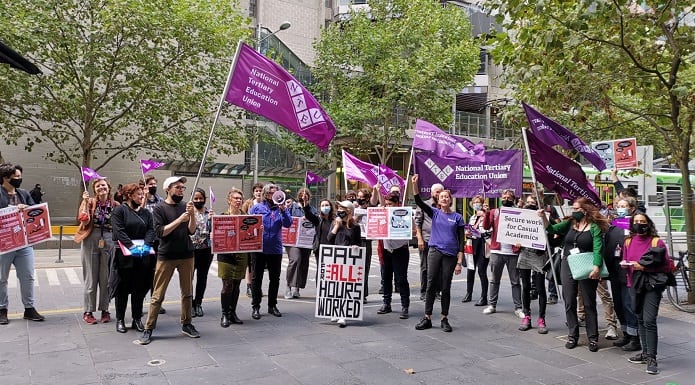On the back of a well-organised and dogged wage theft campaign by casuals, RMIT University in Melbourne has folded—accepting that thousands of low-wage workers be back paid millions of dollars, most before Christmas.
The financial settlement strikes a new national benchmark for the union’s wage theft campaign. RMIT has agreed to pay casual tutors and lecturers what the National Tertiary Education Union (NTEU) calculates to be an average $10,000 each for underpaid marking work done since July 2014.
While RMIT is publicly stating it “only” owes $7.5 million, the union estimates that when individual back payments already made during the bitter dispute are included, plus payments to casuals who have left RMIT since 2014, the total wage theft bill will be more like $10 million.
This is a massive shot in the arm for the union’s national campaign that is already forcing systemic underpayments out of other universities—Melbourne ($10 million), Monash ($8 million) and Sydney ($13 million).
At RMIT, thousands of precariously employed academics have been ripped off about $20 per hour because they were paid at the “standard” marking rate. RMIT acknowledged that its preliminary investigations had found “over 100,000 instances” where the lower rate had been paid—noting this was just “the tip of the tip of the iceberg”.
RMIT managers finally agreed that the higher “academic judgement” rate should always be paid “full stop”, unless a machine could do the marking of the few assignments that have simple yes/no or multiple choice-type answers.
Comprehensive
RMIT’s capitulation was so comprehensive we got more money than we demanded—every piece of marking done by casuals for the past seven years will be paid the higher rate.
Management gave up the attempt to distinguish between which of these two rates should apply between July 2014 and November 2021 (our demand) and agreed to simply backpay everyone the higher rate.
RMIT is spinning this victory as a “mistake” they are quickly rectifying because they “respect” their casual workforce. Nothing could be further from the truth.
It took 15 months of staunch campaigning by casual union members—through petitions, surveys, media blitzes and, despite COVID restrictions, lively street protests. The dispute was organised through a local casuals network holding regular campaign-focused meetings, backed up by a fortnightly newsletter that raised the broader political and industrial issues facing the sector.
A constant stream of new casuals attending these meetings invariably raised the appalling disregard and disrespect by managers to a bewildering range of wage and conditions issues.
The casuals network had a two-pronged approach. First, current individual grievances were delegated to our NTEU industrial officer and we regularly reported back to the casuals network what progress he was making.
Crucially, this allowed us to focus on our second approach—concretely campaigning around one winnable, collective issue at a time, such as underpayment for marking.
The hostility of management to properly pay casuals for the work we do is unrelenting. While RMIT agreed to have a union-initiated oversight committee to ensure every casual since 2014 was paid, they entrenched wage theft into the deal by refusing to pay casuals staffing these monthly committee meetings.
Rank-and-file strategy
Casuals networks at RMIT and the University of Melbourne have adopted a distinctive approach to rank-and-file activism in two related ways.
First, they have adopted the clearest emphasis on mobilisation including protest action. Second, they have emphasised attempting to bring officials alongside their independent rank-and-file campaigning at every step, to the degree that they are both official NTEU Casuals networks.
Melbourne University casual members led a militant campaign of street rallies and occupations to win significant concessions from management, draw hundreds of new members to join the union and increasingly swing official support behind their campaigns.
The RMIT wage theft campaign around marking rates, while less militant, was built using the strategy of our colleagues down the road. Our activism gave many members the confidence to stand together at protests and roast managers in meetings by brilliantly articulating the impact of underpayments on their lives.
NTEU branch support has solidified, and, in the last two months, Victorian state office has also thrown very significant and welcome energy into the dispute.
The breakthrough in the last few months is that wage theft at universities has become a national issue—raised by organised casuals groups and officials in the mass media, at Senate hearings, at Fair Work Australia and the Victorian Wage Inspectorate.
Lucrative
RMIT’s big payout barely scratches the surface of how casuals—the large majority of the university workforce—are being treated like rubbish. Most work done preparing for tutorials and lectures remains unpaid. There is no viable process in place for a casual worker to gain a secure, ongoing job.
The industry’s lucrative business model will need to be broken to achieve the demand that all work done be paid to workers with secure jobs.
The upcoming enterprise bargaining rounds across the country contain these key union demands. They will be won only by building campaigns that empower ongoing and casual members to challenge both this rotten business model and the industrial rules restricting our right to strike.
By Marcus Banks, an NTEU delegate at RMIT






